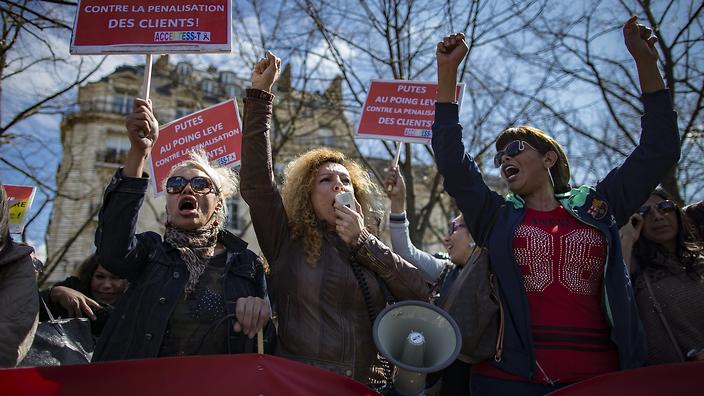The lower house of French Parliament has passed a bill that make it illegal to pay for sex. It will become a law when upper house also approves it. A person who is caught paying for sex will have to pay a fine of 1700$. Repeat offenders will have to pay 4270$.

Transgender sex workers protest against a parliamentary vote to enforce the penalisation of solicitation, near the Assemblee Nationale (French parliament) in Paris, France, 06 April 2016. French parliament is seeking to pass a new bill which would penalise the clients of prostitutes – a move which angers NGO’s prostitutes’ associations, claiming such sanctions could push sex workers further into clandestine operations to circumvent the new sanctions. Signs read ‘Prostitutes, fists raised in the air, against the penalisation of clients’. EPA/IAN LANGSDON
Thus France is following its Nordic neighbours , Sweden ,Norway and Iceland in punishing those who pay for sex and not those who offer it. This new policy views sex workers as victims.
Though many have hailed it as a pro women measure and a step forward to reduce exploitation of women and children, some others, including some sex workers disagree.
They fear that sex work will go underground and workers will get very less protection than present and will be exploited more. Some also criticise the move in terms of loss of autonomy.
It is true that there is a large amount of exploitation in this field and any measure that help the workers to live a free life should be welcomed. If such a measure is going to be implemented rehabilitation of current workers should be given top priority.

The problem is that punishing clients doesn’t work. Look instead at the success NSW has had with decriminalising sex work:
That’s from https://www.afao.org.au/library/hiv-australia/volume-14/vol-14-no-1/transgender-sex-workers-and-the-police#.VwnTTnV94WM
Thank you for this information. I fully agree with you.